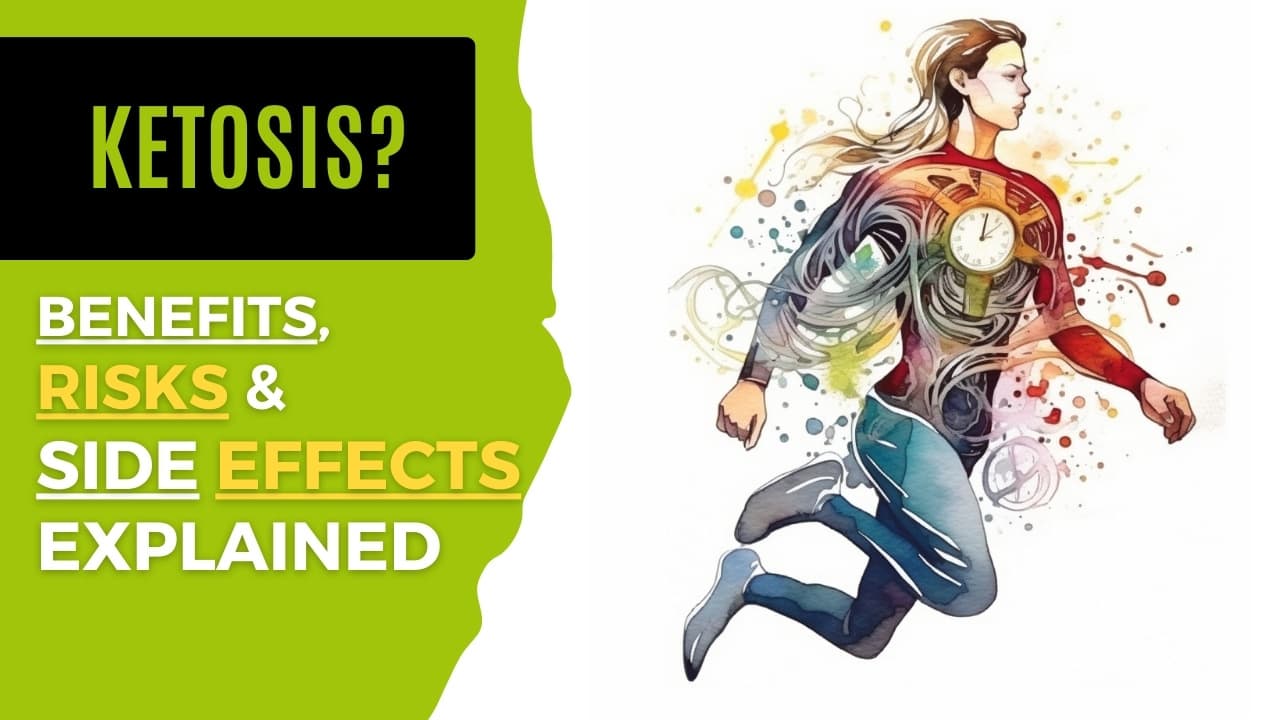
Symptoms of Keto Flu: What You Need to Know

Considering going about a ketogenic diet? Be cautious of the keto flu that is commonly known! Oh no, don’t worry, AllAmerican Payday is here for you. In this blog post, we will discuss what keto flu is, its causes, symptoms, and how people can manage this somewhat enigmatic, yet quite realistic occurrence. Well then, let me grab my seat belt and get ready for the ride that deliberates on keto flu and how to overcome it.
Key Takeaways
Rehydrate the body using right electrolyte and taper off the carbs in a systematic manner in the process of shifting to the ketogenic diet.
To avoid and treat keto flu it is advised that one should intensify the take up of water and other fluids, increase the number of hours of sleep, and pick up light exercises.
It also helps in nourishing one’s body systematically with nutrient-rich foods for a healthy and balanced diet.
Understanding Keto Flu: Causes and Symptoms

Peculiarly, the process is called the keto flu, and it is a set of symptoms some people experience if they switch to ketogenic diets. Although the exact cause remains a puzzle, it is believed to stem from: Although the exact cause remains a puzzle, it is believed to stem from:
the body switching to the low-carb diet
sugar withdrawal
shifts of the composition of the microbial communities in the gut
These include; Dehydration, Genetic factors as well as sudden alteration of the quality of the diet one takes.
When entering ketosis, it is common to experience flu-like symptoms such as: When entering ketosis, it is common to experience flu-like symptoms such as:headaches
muscle cramps
weakness
irritability
lightheadedness
difficulty concentrating
fatigue
dizziness
They may fall sick due to digestive problems like constipation, or they may merely feel nauseous.
Still, such symptoms can persist for several weeks but vary in severity and duration between the participants.
Electrolyte Imbalance
Insulin is an outlined hormone that stimulates the kidneys to shed excess sodium and water, and this, together with the deficiency of potassium, leads to keto flu symptoms. This state may cause uncomfortable sensations such as headache and muscle cramps and even weaken the organism. Switching to this protocol results in your losing some essential nutrients in the body. Hence, items that are low-carb and rich in electrolyte minerals, such as spinach, tomatoes, avocados, and nuts, are important to relish.
Drinking a large amount of water is one of the most effective methods of handling electrolyte problems and virtually any related symptoms. Check your daily water intake and consider adding coconut water or kick-start supplements to your diet.
The mineral and electrolyte balance helps your body respond to the new changes and reduce the effects of the keto flu.
Carbohydrate Withdrawal
Carbohydrate detoxification is another cause of keto flu, which is an actual physical dependence on carbs in the body. The withdrawal symptoms are observed when the carbs intake is cut down and the metabolism switch to burning fats. Personal withdrawal symptoms of carbohydrates are likely to include irritability, light headedness and enhanced difficulty in focus.
Coping with carbohydrate pull-out entails sufficient intake of water and other electrically charged minerals, as well as a progressive decrease in carbohydrate intake. When transitioning from carb-burning to ketosis, you lose glycogen and water in your body; this is used to initiate ketosis with glucose and water stored in your body. This is to mean that it allows gradual onset which in turn may assist in lowering the intensity of symptoms of keto flu.
Dehydration
Other factors that have been cited as causing symptoms of keto flu include dehydration in the process of carb depletion and reduction of water balance in the body for the commencement of the ketosis process. Dehydration can worsen symptoms such as head-ache, tiredness and ‘fuzzy’ thinking. Therefore, colder and frequent intake of water is encouraged to reduce and stabilize him and keto flu signs.
Although water is generally a good supplement throughout the day, but it is advised to consume more water along with including liquids that provide electrolytes such as coconut water. Avoid taking beverages containing high-sugar content, and alcohol, that results in formation of keto-flu symptoms due to dehydration.
Identifying Keto Flu Symptoms

Therefore, understanding some of the symptoms that are associated with the keto flu is really useful and can help you manage this phase better. Potential symptoms include:
Nausea
Constipation
Headaches
Achiness
Fatigue
Dizziness
Insomnia
Muscle aches
Brain fog
Poor concentration
Mood changes
Irritability
Decreased libido
Hunger
Being conscious of such signs shall help the individual to intervene and reduce the levels of pain. Therefore, when you are set on your ketogenic diet, you should be sure to watch out for any of the mentioned symptoms and act accordingly. However, not all the symptoms will be felt by all patients, and the severity of the illness may differ from one patient to another. It is here that the role of knowledge on your body’s reaction comes into play and makes necessary changes to your diet and lifestyle.
Fatigue and Weakness
Headaches, muscle cramps, diarrhoea, as well as fatigue and weakness, are part of the keto-flu symptoms because your body takes time to shift its mechanism to get most of its energy from fats. The body tries to process a new source of fuel, which belongs to the Ketogenic diet, and this may result in poor concentration and foggy brain during Keto flu.
For fatigue relief and improved energy, there are certain measures that can be complied with like; ensuring you take water, replacing electrolytes and reducing on carbohydrates slowly. By adopting these measures it will not only be possible to address issues of fatigue and weakness but will also serve to boost on the positive impacts of the ketogenic diet.
Headaches and Dizziness
Thus, experiencing certain symptoms, one is more likely to have gezstoff headaches, dizziness because of low levels of sodium, low potassium levels, dehydrations, and low level blood sugar levels in their body. But these are irritating symptoms that may make the transition to a ketogenic diet very unbearable though can be managed.
He has mentioned that people, who experience the keto flu, can control the headache and dizziness by drinking adequate water to flush out the body’s system, replacing the electrolytes in the body and gradually reducing the intake of carbs in the body. Accordingly, when these steps are taken then your body is given the opportunity to respond in terms of the diet plan and symptoms such as these are eased.
Digestive Issues
Other side effects may also be noticed and include constipation, nausea and diarrhea if experiencing keto flue as the body adapts to the new way of using fats and very little carbohydrates. Such symptoms can be quite annoying, although in most cases they are temporary and the body is still in the process of responding to the change in diet.
For effective management of digestion issues in keto flu, one must recommend proper water intake, proper electrolyte intake, as well as gradual changes in low carb diets. With such approaches, it is possible to counter the problem of digestion and look after the health upon switching to a ketogenic diet.
Reducing and Managing Keto Flu Symptoms

With the knowledge of some of the signs of keto flu now laid down, it is important to highlight ways of lessening and dealing with them more effectively. Drawing this process to the end, there are the principal actions helpful in minimizing these symptoms: drinking more water, replenishing the loss of electrolytes, and gradually decreasing carbohydrate consumption.
With these measures taken, not only will you decrease the pain of the keto flu, but you will also increase your body’s readiness for ketosis, which will further the benefits of the ketogenic diet. Again, it is important that during this period, one is consistent and patient since the body is in the process of adapting to such a change.
Staying Hydrated
It is recommended to drink plenty of water during keto flu to reduce symptoms’ severity as headaches, fatigue and muscles cramps. It is also good to note that proper hydration not just assists in decreasing symptoms but also our overall health.
This and in order for the body to be fully hydrated then adequate water intake should be taken throughout the day and it is advised that one should take coconut water since it contains many electorlytes. Do not consume sugary products and alcohol, particularly alcoholic beverages, because they may cause dehydration and increase the severity of the symptoms of keto flu.
Replenishing Electrolytes
Taking supplements especially the electrolytes is important when on the keto flu as it causes muscle cramps, weakness, and nausea. Eating such foods as vegetables, avocados, nuts among others replenishes the supply of the electrolytes and makes the body to be active.
Moreover, apart from eating the foods which have a high electrolyte content, you can take supplements in a bid to check your electrolyte level. You will be assisting your body to balance the electrolytes to kickstart the ketosis process and minimize on the flora’s impact.
Gradual Carb Reduction
It is less likely to get keto flu symptoms when you slowly ditch carbs instead of going on an abrupt keto diet. Carbohydrates should be cut slowly for better results because the body can adapt to them and will not show severe withdrawal effects.
Cut your carb intake even by 10-15% in a week’s time and do not forget to include adequate fats and proteins in your diet plan. Do not forget about getting proper amounts of sleep and exercising as often as possible for the best outcomes. In this manner, one will experience an easier transition to the low-carb diet, prevent the symptoms of keto flu and lose weight most efficiently.
Preventing Keto Flu: Tips for a Smooth Transition

If you follow a balanced diet, engage in light exercises, and improve your sleep, you won’t be prone to developing keto flu. Taking them into consideration, you can provide your body with the necessary support to switch to the state of ketosis and minimize the chances of actually getting keto flu.
In the next couple of subtopics, we shall expand on these strategies, and also give best practices to help you avoid Keto-flu and transition to the ketogenic diet effectively.
Balanced Diet
It is important to adhere to a low-carb diet but also include non-starchy vegetables in your daily intake as well as sufficient amounts of healthy fats to help managers overcome the flu symptons that may be associised with keto diet. Nutrition can be used to supplement your body to ensure that you have all the nutrients your body requires as you wait for your body to adjust to the ketone diet.
Ensure you maintain a list of foods that are allowed on the keto diet and foods rich in nutrients required by the body to reduce the intake of processed foods. Some examples include:
Leafy greens
Avocados
Nuts
Seeds
Most importantly, by following a proper diet, one will not be too susceptible to develop the keto-flu symptoms, as well as ensure that the body is well nourished.
Light Exercise
Engaging in some exercise like walking, or doing some yoga will go along way in alleviating the symptoms of keto flu and getting the body to shift smoothly into ketosis. It is known that the circulation of the blood and oxygen to the muscles improves due to exercise, and therefore, one will not necessarily be easily fatigued or tired.
Incorporating activities like:
walking slowly
doing household chores
engaging in leisurely sports
Practicing yoga or pilates, which can be easily included in your daily schedule, helps to ease the process of switching to ketosis by lowering stress and anxiety levels. I agree with the need to be constant, so for this reason, try to engage in some sort of light exercise daily.
Sleep Quality
Staying in good quality sleep is very important when dealing with keto flu symptoms because a lack of sleep will also make the symptoms of fatigue and irritability worse. There are ways to minimize keto flu symptoms; the help comes from enhancing the quality of sleep, which in turn lowers cortisol, a stress hormone that, when reduced, eases keto flu impacts.
To improve the quality of sleep, people should go to bed and wake up at the same time every day, create a special ritual before going to bed, and make the environment suitable for sleeping. Ensuring that one gets enough quality sleep will assist in the management of keto flu symptoms in addition to other health benefits that arise from sufficient sleep.
Summary
Thus, keto flu can certainly be considered a genuinely existing condition that patients have when using the ketogenic diet. Thus, it is crucial to comprehend how keto flu comes about, how one can identify its manifestations, and how it is possible to manage and avoid it as a way of effectively overcoming this phase of the use of the ketogenic diet for improving one’s health. However, keep in mind that it is very important to be consistent with your chosen diet, be patient, and take proper care of yourself permanently, especially for the new body’s change into ketosis.
Frequently Asked Questions
How long does keto flu typically last?
The few days starting from when someone takes ketogenic diet usually encounters some flu like symptoms which are commonly referred to as the keto flu. Nevertheless, there are individuals who may perhaps experience the keto flu for a week, a few days, a couple of weeks, or some may not feel it at all for an entire month.
What are the first signs of ketosis?
Ketosis symptoms include loss of weight, dryness of the mouth and breath, alterations of sleep and exercise performance for a short while, muscle twitches and cramps, loss of appetite, and alterations of bowel movements.
What are the symptoms of carbohydrate withdrawal?
Substantial reduction of carbohydrate intake leads to some discomforting and alarmingly even sickly signs including; foggy brain, headaches, flu-like symptoms, constipation, halitoses, the muscle cramps, bloating, diarrhea, generalized weakness, and rash. These effects are mostly temporary, but it is advisable to think if cutting on carbs is indeed healthy for you.
Can keto flu make you sick?
Though most people with keto flu experience mild to severe symptoms, there is no denying that it can mark the onset of a slimming journey. It is the same case with cold turkey withdrawal; while some patients may develop no complications, others experience severe withdrawal symptoms.
How can I manage keto flu symptoms?
To prevent or lessen the severity of keto flu, it is recommended to drink more water, electrolytes, and to gradually cut back on the consumption of carbohydrates.
Comments (0)
Add comment
Your email address will not be published. Required fields are marked *
You May Also Like

The ketogenic (keto) diet is quickly becoming famous across the globe due to the belief that it can help one lose weight and boost the body’s health. This means that one can eat a large amount of fat and limited Carbohydrates in an attempt to...

Considering going on the keto diet? Because it is crucial to comprehend the “ketosis benefits risks side effects” in the first place. Thus this guide will cover the benefits of the diet including effectiveness in reducing weight, boosting concentration, among others as well as the...




